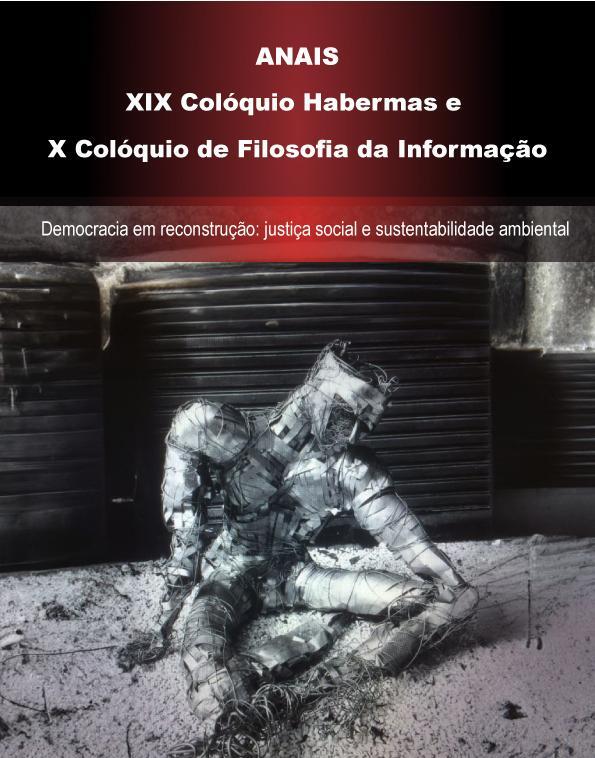DISCURSIVE SPACES AS A POSSIBILITY FOR HUMAN FORMATION AND INCLUSION
DOI:
https://doi.org/10.21728/logeion.2023v10nesp2.p278-295Keywords:
Discursive Space, Jurgen Habermas, Human FormationAbstract
Based on the concepts of Jürgen Habermas's Theory of Communicative Action, the Discursive Spaces make it possible, by democratic means, to debate training, management and school inclusion within the collaborative networks established between the university, municipal and state education networks and higher education institutions in Portuguese-speaking countries, through research and extension projects. The purpose is to understand the discursive space as a space for participation between subjects that, through discourse, present arguments to build consensus and strengthen mutual understanding, in order to capture the movements experienced by researchers and participants in research processes carried out through action research; and also to encourage the development of collaborative formation spaces in defense of human formation from the perspective of inclusion. We chose to use qualitative collaborative-critical action research to understand how Discursive Spaces have been configured in the context of the research group. In this initial research process, we took the participants arguments in the moments of constitution of the understanding of Discursive Spaces, in the planning and realization of them. Two municipal education networks took part, involving (municipal) managers, students and teachers (graduate and postgraduate), with training, public policies, management and action research being the themes. It is an urgent challenge to deepen our understanding of these processes and an enormous challenge to establish a culture of sustainability of life, in other words, to promote a re-reading of the world in which life in all its relationships and contradictions is central.
Downloads
References
ALMEIDA, M. L. de. Uma análise da produção acadêmica sobre os usos da pesquisa- ação em processos de inclusão escolar: entre o agir comunicativo e o agir estratégico. 2010. Tese (Doutorado em Educação) – Universidade Federal do Espírito Santo, Vitória, 2010.
CARR, W.; KEMMIS, S. Teoría crítica de la enseñanza: la investigación-acción en la formación del profesorado. Tradução J. A. Bravo. Barcelona: Martínez Roca, 1988.
CARR, W. Critical Action Research Today. Estreiadiálogos: Revista da Rede Internacional de Investigação-Ação Colaborativa, n. 1, p. 14-26, jul. 2019.
CARVALHO, D. S. A construção de um currículo de formação continuada na perspectiva da inclusão escolar: contribuições da teoria do agir comunicativo. 2018. 2018. Dissertação (Mestrado em Ensino, Educação Básica e Formação de Professores) - Universidade Federal do Espírito Santo, Alegre, 2018.
FRANCO, M. A. S; LISITA, V. M. S S. Pesquisa-ação: limites e possibilidades na formação docente. In: PIMENTA, S. G; FRANCO, M. A. S. (Org.). Pesquisa em educação: possibilidades investigativas/formativas da pesquisa-ação. São Paulo: Edições Loyola, 2014. p. 41-70.
FRANÇA, B. R. B; ALMEIDA, M. L. de; GAMA, Alexsandra Polini de Jesus da. A formação continuada na perspectiva inclusiva: mapeamento da produção de um grupo de pesquisa. Anais do Seminário Nacional de Educação Especial e do Seminário Capixaba de Educação Inclusiva, v. 4, n. 4, p. 464-477, 2022. Disponível em: https://periodicos.ufes.br/snee/article/view/40652. Acesso em: 15 jun. 2023.
JESUS, D. M. de; VIEIRA, A. B.; EFFGEN, A. P. S. Pesquisa-ação colaborativocrítica: em busca de uma epistemologia. Educação & Realidade, Porto Alegre, v. 39, n. 3, p. 771-788, jul./set. 2014. Disponível em: http://www.ufrgs.br/edu_realidade. Acesso em: 04 set. 2023.
HABERMAS, J. Consciência moral e agir comunicativo. Rio de Janeiro: Tempo Brasileiro, 1989.
HABERMAS, Jürgen. Verdade e justificação: ensaios filosóficos. Trad. Milton. Camargo Mota. São Paulo: Edições Loyola, 2004.
HABERMAS, J. Conhecimento e interesse. São Paulo: Editora Unesp, 2014.
HABERMAS, Jürgen. Mudança estrutural da esfera pública: investigações quanto a uma categoria da sociedade burguesa. Tradução: Flávio R. Kothe. Rio de Janeiro: Tempo Brasileiro, 2003. 398p.
HABERMAS, Jürgen. Teoría de la acción comunicativa I: Racionalidad de la acción y racionalización social. Tradução de Manuel Jiménez Redondo. Madrid: Taurus, 1987.
HABERMAS, J..Teoria do Agir Comunicativo: Racionalidade da ação e racionalidade social. Tradução de Paulo Astor Soethe. São Paulo. WMF Martins Fontes, 2012.
HABERMAS. Notas programáticas para a fundamentação de uma ética do discurso. In: Consciência Moral e Agir Comunicativo. Tradução de Guido Antônio de Almeida. Rio de Janeiro: Tempo brasileiro, 1989, pp.61-141.
HABERMAS, J. O discurso filosófico da modernidade. Tradução Luiz Sérgio Repa e Rodnei Nascimento. São Paulo: Martins Fontes, 2000.
RAMOS, S.D.H.P; LOBINO, M.G.F; HERNANDEZ-PILOTO, S.S.F. Educação Ambiental Como Ato Responsável: Ensaio Sobre Formação Continuada do Ecoeducador. In: SALES, R.E.S; SALES, R. S. Educação ambiental e cidadania: pesquisa e práticas contemporâneas - volume 1. São Paulo: Editora Científico Digital, 2021, p. 217-235.
SILVA, N. V. da. A gestão de educação especial e a formação continuada de rede municipal de ensino Marataízes/ES: a pesquisa-ação em foco. 2019. Dissertação (Mestrado em Ensino, Educação Básica e Formação de Professores) – Centro de Ciências Exatas, Naturais e da Saúde, Universidade Federal do Espírito Santo, Alegre, 2019.
ŽIŽEK, S. A amazonia está em chamas – e daí?. Blog da Boitempo. São Paulo. 04/09/2019. Disponível em:https://blogdaboitempo.com.br/2019/09/04/zizek-a-amazonia-esta-em-chamas- -e-dai/. Acesso em 19 de dezembro de 2020.
Downloads
Published
Issue
Section
License
Copyright (c) 2023 Logeion: Filosofia da Informação

This work is licensed under a Creative Commons Attribution-NonCommercial-ShareAlike 4.0 International License.
The journal is published under the Creative Commons - Attribution - Noncommercial - Share Alike 3.0 Brazil.
The published work is considered collaboration and therefore the author will not receive any remuneration for this as well as anything will be charged in exchange for publication.
All texts are responsibility of the authors.
It’s allowed partial or total reproduction of the texts of the magazine since the source is cited.














